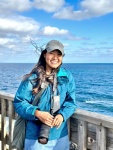

Crystle Wee
crystle.wee@gmail.com
Recipient of an AIMS@JCU Scholarship
PhD
College of Science and Engineering

Crystle Wee
crystle.wee@gmail.com
PhD
College of Science and Engineering
Efficacy of transferring ReefSeed coral-seeding technology to remote communities to enhance the deployment and survival of corals for reef restoration
Crystle’s unwavering dream of becoming a marine biologist first started at the age of 6 when she thought it meant being able to talk to dolphins. Since then, her obsession with marine life has expanded to many more organisms that call the ocean home, which has resulted in an unhealthy collection of identification guides and a lifelong addiction to SCUBA diving.
Her first foray into coral reef science started in Malapascua, Philippines in 2013 where she volunteered to conduct reef surveys at thresher shark cleaning stations affected by dive tourism. Upon graduating from the Bachelor of Environmental Studies programme at the National University of Singapore, she ventured to the Maldives to work on coral monitoring and restoration initiatives, seeing firsthand the devastation of the 2016 bleaching event. She then returned home to Singapore where she worked in a consultancy for 5 years on a variety of environmental impact assessments and monitoring programmes, including large-scale coral relocation from reclamation works. After completing a Master of Science in Biodiversity Conservation and Nature-based Climate Solutions at NUS, she joined ITOPF, an organization dedicated to addressing ship-source pollution such as oil spills, where she conducted oil spill preparedness training and provided technical advice on spills.
Efficacy of transferring ReefSeed coral-seeding technology to remote communities to enhance the deployment and survival of corals for reef restoration
2024 to 2028
Project Description
To test the transferability of ReefSeed biology, ecology and technology for reef restoration in the Maldives, through four primary objectives: (1) improving our understanding of coral reproduction in the Maldives through assessments of spawning timing and synchronicity across taxa; (2) comparing the effectiveness of seeding methods for key coral taxa on the GBR and in the Maldives; (3) identifying primary barriers that hinder the survival and growth of coral larvae during their vulnerable early stages, and (4) documenting the process and learnings of technology transfer and capacity building to remote communities as a case study.
Project Importance
Active restoration methods like coral seeding play a crucial role in restoring coral populations within degraded environments. Interventions like ReefSeed are particularly significant as they overcome challenges such as limited genetic diversity, connectivity, and larval availability. Development of such technology can minimize production time and deliver high survival of corals on environmentally-safe seeding devices, to reduce costs, increase throughput, and empower local practitioners.
Project Methods
The project will improve upon existing ReefSeed technology and facilitate knowledge transfer in remote Maldivian reefs. This includes calculating fertilization rates, survival, and growth, of coral embryos, larvae and spat of multiple taxa, subjected to various seeding techniques. We will also undertake field deployments to model the relationship between survival/yield against environmental metrics, and use circular statistics (directional statistics) to describe spawning patterns and synchronicity in Maldivian and GBR conspecifics.
Project Results
The project hopes to successfully implement the ReefSeed technology in Maldivian reefs to scale-up, improve survivability and expedite coral restoration. The larger aim is to improve our understanding of transfer knowledge and capacity to reef restoration practitioners around the globe, and empower them to manage their own reefs.
Keywords
Aquaculture,
Artificial reef,
Climate change,
Communication / Education,
Coral reefs,
Corals,
Ecology,
Field based,
Management tools,
Manipulative experiments,
Mariculture,
Monitoring,
Quantitative marine science